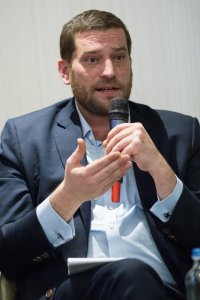The main purpose of the event was to launch the project and present its objectives and expected results, however it also provided the opportunity for attendees to discuss and share information on relevant approaches and initiatives. The date of the event was chosen to coincide with the Universal Children’s Day to serve as a reminder that too many children still do not enjoy their basic rights and childhood as they are engaged in child labour.

During the morning session, Didier spoke on a panel entitled “Towards responsible cotton, textile and garment: the role of companies and actors within the supply chain”. Panelists explored the key role of private companies and actors within the supply chain, including informal settings, in improving working conditions in general, and in monitoring the prevalence of child labour and forced labour and fighting it.
Didier noted the importance that companies recognise existing forms of forced labour in their supply chains and spoke about the CGF’s Priority Industry Principles, designed to guide company actions against forced labour so that every worker should have freedom of movement; that no one pays for a job; and no worker should be coerced to work. He reiterated the need to stop duplicating efforts and instead start effectively organising efforts.

